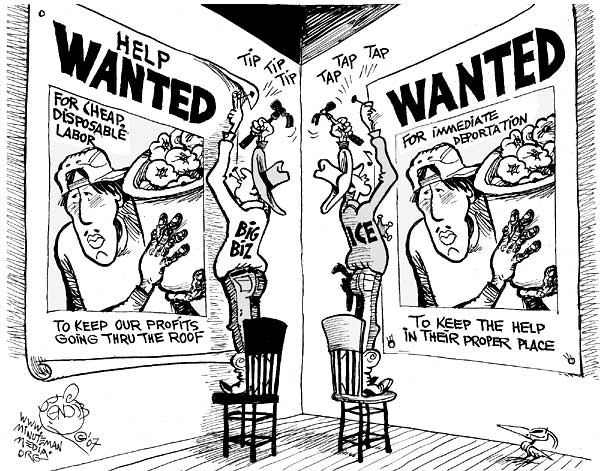
Samuel Levesque
Position Paper 1: Taking Sides
On the issue of whether or not sustainable development is compatible with human welfare my answer is a resounding “yes”, though not for any of the reasons put forward by Dinah M. Payne, Cecily A. Raiborn, or Ronald Bailey. While the authors question if sustainable development is compatible with human welfare, they fail to ask if industrialized capitalist corporatism is compatible with sustainable development.
Both articles are based on the premise that Globalist corporate capitalism and the so-called free market are inevitable, unchangeable, and therefore a given. While Bailey argues that continuing the current course of development will result in the system curing the very ills it produces, Raiborn and Payne argue that while the system produces ills, it can be reformed from within and without into a higher-minded force for ecological and social good. In essence Raiborn and Payne argue for the physician to heal himself, where as Bailey argues that smoking cures cancer.
It is my contention that any system in which a relative few control the vast majority of available resources in order to further profit those who own shares of said resources will never lead to a socially just, ecologically sound, and economically prosperous future for the vast majority of humanity. Instead the continued accumulation of resources necessary for life (land/soil, water, food, etc) into the hands of a select elite will result in a continuance of manufactured scarcity (which drives up profits) and manufactured needs (which increase consumption and drive up pollution) with all the human and ecological degradation that such a system entails, no matter how sustainable the practices of individual institutions become.
Far from accepting the argument that industrialism, let alone capitalist industrialism is a boon to mankind, and that somehow if left unchecked will correct the very problems it causes, I contend that by their very structures industrialism and capitalism (in particular corporatism) are themselves detrimental to human welfare and therefore have no real role in sustainable development.
In my view what is needed is not a tweak to the existing system, but a fundamental shift in how humanity supplies its basic needs, with an aim to meet those needs (as well as most of our less destructive wants) while repairing or restoring as much ecological vitality as possible. This happy situation can be realized not by simply changing the goods mass produced and the technical processes that produce them, but by changing the very nature of production. As E.F. Schumacher once put it, want is needed is not more mass production, but more “production by the masses”.
Small-scale, decentralized local production of the sort championed by Schumacher, Jerry Mander, Kirkpatrick Sales, and even Gandhi is far more likely to be ecologically sound (as it does not “export” its pollution over the horizon), egalitarian (see Mander’s In the Absence of the Sacred), and adaptable than massive corporate structures, not to mention more profitable to those involved (if one counts profit as production for one’s own use) as there are no capitalist middlemen harvesting the fruits of other’s labor. The kind of top-down profit-driven “development” championed by the authors of both articles will only lead to continued ecological damage, just as top-down ideologically driven “reform” could very well lead to the sort inequality and enforced poverty that Bailey fears. Global sustainability must begin small-scale, decentralized, and free of hierarchal institutions to be adaptable to local ecosystems, populations, and economies.
Schumacher, E.F. Small is Beautiful: Economics as if People Mattered. Harper and Row, New York. 1975.
Mander, Jerry. In the Absence of the Sacred: The Failure of Technology and the Survial of the Indian Nations. Sierra Club Books, San Francisco. 1991
Sales, Kirkpatrick. Rebels Against the Future: Lessons for the Computer Age. Perseus Publishing, Cambridge. 1995.
“Gandhian Economics” Wikipedia. http://en.wikipedia.org/wiki/Gandhian_economics







